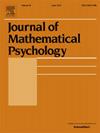An entropy model of decision uncertainty
IF 1.5
4区 心理学
Q2 MATHEMATICS, INTERDISCIPLINARY APPLICATIONS
引用次数: 0
Abstract
Studying metacognition, the introspection of one's own decisions, can provide insights into the mechanisms underlying the decisions. Here we show that observers’ uncertainty about their decisions incorporates both the entropy of the stimuli and the entropy of their response probabilities across the psychometric function. Describing uncertainty data with a functional form permits the measurement of internal parameters not measurable from the decision responses alone. To test and demonstrate the utility of this novel model, we measured uncertainty in 11 participants as they judged the relative contrast appearance of two stimuli in several experiments employing implicit bias or attentional cues. The entropy model enabled an otherwise intractable quantitative analysis of participants’ uncertainty, which in one case distinguished two comparative judgments that produced nearly identical psychometric functions. In contrast, comparative and equality judgments with different behavioral reports yielded uncertainty reports that were not significantly different. The entropy model was able to successfully account for uncertainty in these two different types of decisions that resulted in differently shaped psychometric functions, and the entropy contribution from the stimuli, which were identical across experiments, was consistent. An observer's uncertainty could therefore be measured as the total entropy of the inputs and outputs of the stimulus-response system, i.e. the entropy of the stimuli plus the entropy of the observer's responses.
决策不确定性的熵模型
研究元认知,即对自己的决定进行内省,可以深入了解决策背后的机制。在这里,我们表明观察者对他们的决定的不确定性包含刺激的熵和他们在心理测量函数中的反应概率的熵。用函数形式描述不确定性数据允许测量内部参数,这些参数不能仅从决策响应中测量。为了测试和证明这个新模型的实用性,我们测量了11名参与者在几个实验中使用内隐偏见或注意线索判断两种刺激的相对对比外观时的不确定性。熵模型可以对参与者的不确定性进行难以处理的定量分析,在一个案例中,它区分了两种产生几乎相同心理测量功能的比较判断。相比之下,不同行为报告的比较判断和平等判断产生的不确定性报告没有显著差异。熵模型能够成功地解释这两种不同类型的决策的不确定性,这两种决策导致了不同形状的心理测量功能,并且刺激的熵贡献在实验中是相同的,是一致的。因此,观察者的不确定性可以用刺激-反应系统输入和输出的总熵来测量,即刺激的熵加上观察者的反应的熵。
本文章由计算机程序翻译,如有差异,请以英文原文为准。
求助全文
约1分钟内获得全文
求助全文
来源期刊

Journal of Mathematical Psychology
医学-数学跨学科应用
CiteScore
3.70
自引率
11.10%
发文量
37
审稿时长
20.2 weeks
期刊介绍:
The Journal of Mathematical Psychology includes articles, monographs and reviews, notes and commentaries, and book reviews in all areas of mathematical psychology. Empirical and theoretical contributions are equally welcome.
Areas of special interest include, but are not limited to, fundamental measurement and psychological process models, such as those based upon neural network or information processing concepts. A partial listing of substantive areas covered include sensation and perception, psychophysics, learning and memory, problem solving, judgment and decision-making, and motivation.
The Journal of Mathematical Psychology is affiliated with the Society for Mathematical Psychology.
Research Areas include:
• Models for sensation and perception, learning, memory and thinking
• Fundamental measurement and scaling
• Decision making
• Neural modeling and networks
• Psychophysics and signal detection
• Neuropsychological theories
• Psycholinguistics
• Motivational dynamics
• Animal behavior
• Psychometric theory
 求助内容:
求助内容: 应助结果提醒方式:
应助结果提醒方式:


